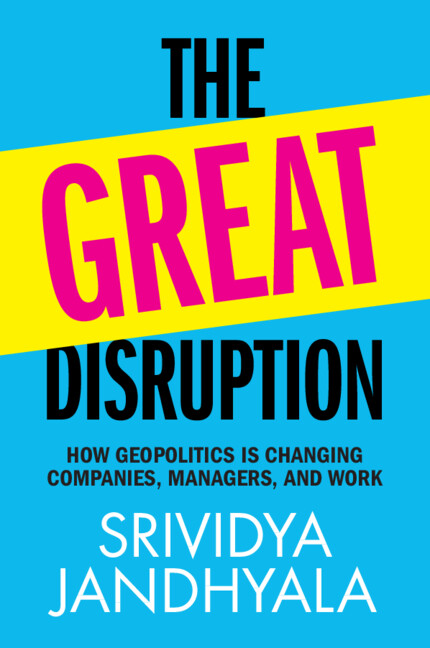As the world was limping back to normal after COVID, some people seemed to have it all. Their days might have started with a run on a tropical beach and breakfast at a quaint café. They worked by the poolside, sipping a drink, and watched magnificent sunsets over towering cliffs and crashing waves. It seemed that all they needed was a reliable wi-fi connection, their trusty laptops, and flexible schedules. Surely, you might have thought, the future of work looked promising for a digital nomad.
The workforce of the future may look different from the traditional one, but perhaps not in ways you might think. Rising geopolitical tensions mean that the digital nomad will remain a mirage for most people. Instead, an alternate future is taking shape, influencing who works, where work can be done, and how work is done. Srividya Jandhyala, professor of management and author of the book "The Great Disruption: How Geopolitics is Changing Companies, Managers, and Work", explores the link between geopolitics and the future of work.
Who works?
As geopolitical tensions rise, global companies are increasingly taking a hard look at their workforce, trying to determine who can work on different types of projects. There are more restrictions on who works on leading and cutting-edge projects, individuals that companies can hire, and access to firm-level data that an employee can get.
In the US, for example, Chinese students face increasing scrutiny. Technology companies in Silicon Valley are escalating their security vetting of potential recruits in efforts to keep commercial information and trade secrets safe from espionage. At the same time, trade wars are reshaping the wider labor market. Singapore’s Straits Times reported that the central bank cautioned trade wars and trade policy uncertainty could risk jobs in the country. As production and exports from Asian factories slide, millions of jobs may be affected – in Asia and elsewhere. Thai workers manufacturing solar cells are bearing the brunt of a trade war between China and the US. Reporting by the New York Times highlighted the case of Jane Hu, an office worker in Shanghai who lost her job when Chinese duties on American imports spiked making it unaffordable for her company to continue bringing machinery from the US to China.
The question of who works goes all the way to the top of a company’s leadership. Momentus, a $1.2 billion California-based space transportation start-up was looking at a public listing. But the news was not so good for the company’s founder and CEO, Mikhail Kokorich. As a Russian citizen, Kokorich would not have been able to review technical information about his own company’s projects due to US government export control regulations. He resigned from the company he founded. Similarly, recent research examining over 1000 foreign directors in listed Chinese firms found that as political relations deteriorated, foreign directors were more likely to exit from their roles.
Where can work be done?
The characteristic most exemplified by the digital nomad was being freed from the office. If they can work from anywhere, why not choose a location with breathtaking views, low cost of living, or a good community support system? This narrative has come to a screeching halt. Not only are companies forcing employees to return to the office, but they are also putting in place greater restrictions on where actual work can be done.
Take, for instance, accessing your company’s data. An increasing number of countries are imposing rules on data storage and processing requirements, prohibiting the possibility for data to flow outside the country. Data localization is a means to protect information that might be deemed sensitive from a national security perspective. But it also means you may not have access to your company’s data while you are outside the country. Globally distributed teams of a multinational company may be restricted in their work because they cannot access data from another location. Companies must recruit local teams, with each working in silos and reducing the possibility of economies of scale.
Take the case of TikTok in the EU. The company was fined for storing some European users’ data on servers in China. Other companies are developing strategies to deal with tighter access to data stored in China. Morgan Stanley moved 200 technology developers out of mainland China after the country tightened access.
The dream of a unified, global, and borderless internet is colliding with the geopolitical realities of data sovereignty.
How is work done?
The digital nomad was also one with a clearly defined job description and could easily coordinate with colleagues using digital communication tools. However, geopolitical realities are also changing those two assumptions.
For one thing, most managers of global companies came of age in an era where geopolitics did not have a constraining role. They went to business school to learn about economics, reading financial statements, analyzing investments, selling to old and new customers, and managing a distributed and diverse workforce. They had little-to-no training on how to navigate a changing world dominated by grand politics. As they face a new landscape, they have to figure it out on the fly.
Some companies have set up war rooms to track developments and present their leadership with options, but in doing so several employees have just stopped doing their day jobs. It’s not getting any easier for senior management, who may now have to manage governments and the evolving policy landscape in addition to their employees, customers, or operations. The auto industry provides an example. In the US, automotive companies are lobbying the government to reconsider tariffs. European car manufacturers are shutting plants as they navigate the bottlenecks from Chinese export curbs of rare earths. Chinese EV manufacturers, facing intense price competition, are encouraged by the officials to self-regulate.
All this means managerial work calls for skills to build and maintain relationships with multiple governmental, policy, and non-governmental stakeholders. Such coalition building is not something that can easily be accomplished by digital nomads.
Looking ahead
The future of work typically refers to an evolving landscape of employment shaped by trends in automation, artificial intelligence, and remote work. While each of these factors will, no doubt, influence how employees engage with work, they don’t tell us the full story. Hovering over each of these trends are geopolitical factors that can determine how the trends evolve.
Further reading

The Great Disruption: How Geopolitics is Changing Companies, Managers, and Work (Cambridge University Press, 2025), #1 bestseller on Amazon.









